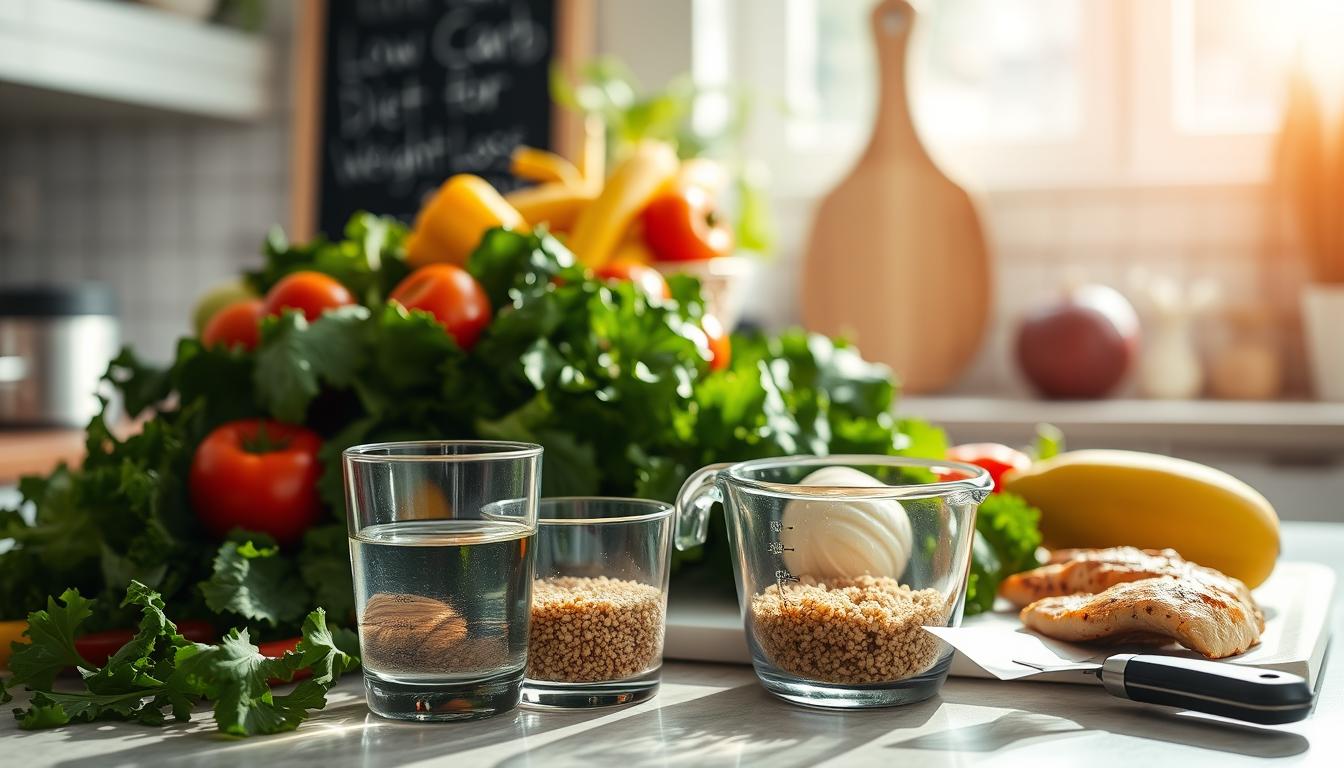Embarking on a journey toward a healthier lifestyle doesn’t have to feel overwhelming. I’ve learned that small, consistent changes can make a big difference. Instead of focusing on drastic measures, it’s about creating habits that fit seamlessly into daily life.
For example, incorporating more movement into your routine or paying attention to portion sizes can have a lasting impact. Weight loss isn’t just about numbers on a scale; it’s about feeling better and more energized every day.
Research shows that simple tweaks, like drinking water before meals or chewing food slowly, can help reduce calorie intake. These strategies are practical and sustainable, making it easier to achieve your goals without feeling deprived.
By focusing on gradual progress, you can build a healthier relationship with food and activity. Let’s explore some easy, science-backed tips that can help you on this journey.
Key Takeaways
- Small, consistent changes lead to sustainable results.
- Drinking water before meals can reduce calorie intake.
- Chewing food slowly helps with portion control.
- Regular physical activity supports overall health.
- Focus on gradual progress for long-term success.
Introduction: Achieving Healthy Weight Loss Without Extreme Diets
Healthy weight loss doesn’t require drastic measures or extreme restrictions. Instead, it’s about making smart choices that fit into your daily life. Research from the CDC and other studies shows that traditional diets aren’t the only way to maintain a calorie deficit and improve health.
Balanced nutrition plays a crucial role in sustainable results. By focusing on nutrient-dense food, you can fuel your body without feeling deprived. Portion control is another key factor—it helps manage calorie intake while still enjoying your meals.
Small lifestyle adjustments can lead to significant changes over time. For example, choosing whole grains over refined ones or adding more vegetables to your plate can make a big difference. These habits are practical and easy to maintain.
Understanding the science behind these strategies can empower you to make informed decisions. In the following sections, we’ll explore practical tips and insights to help you achieve your goals in a healthy, sustainable way.
Understanding the Science Behind Weight Loss
Understanding the science behind weight loss can empower you to make smarter choices. At its core, weight loss is about balancing the calories you consume with the calories you burn. This principle, known as a calorie deficit, is the foundation of any successful plan.
Discover the Secret to Fast Weight Loss!

Maintaining a Calorie Deficit
A calorie deficit occurs when you burn more calories than you consume. This doesn’t require extreme measures. Simple changes, like choosing nutrient-dense foods and being mindful of portion sizes, can help. Your body burns calories even at rest, known as your basal metabolic rate (BMR). Adding physical activity increases this burn, making it easier to create a deficit.
The Role of Exercise Beyond Weight Loss
The role of exercise extends beyond weight loss. Regular physical activity enhances mental health, strengthens bones, and boosts immunity. Even 30 minutes of activity a day can help. Studies show that combining exercise with a balanced diet yields the best results. It’s not just about shedding pounds—it’s about improving overall health.
By understanding these principles, you can create a sustainable plan that works for your body and lifestyle. Small, consistent changes lead to lasting results.
How to lose weight without extreme diets
Small, consistent efforts can lead to lasting changes in your health journey. One of the most effective ways to stay on track is by incorporating physical activity into your daily routine. You don’t need a strict gym schedule—simple actions like walking or stretching can make a difference.
Short bursts of activity throughout the day can be just as effective as longer workouts. For example, taking a 10-minute walk after meals or doing a quick set of exercises during breaks can add up over time. These small changes are easy to maintain and fit seamlessly into your life.
Hydration also plays a crucial role. Drinking water before meals can help control your appetite and reduce calorie intake. Studies show that staying hydrated boosts metabolism, making it easier to manage your energy levels. “A well-hydrated body functions more efficiently,” says a recent study.
By focusing on manageable changes, you can achieve your goals without feeling overwhelmed. Sustainable habits, like staying active and drinking enough water, can replicate the benefits of more rigid plans. Over time, these small steps lead to big results.
Mindful Eating and Portion Control
Mindful eating can transform your relationship with food and support your health goals. It’s about being present during meals and paying attention to hunger cues. This way of eating helps you enjoy your food more and prevents overeating.
Burn Fat & Boost Your Metabolism!

Chewing Slowly for Satiety
Chewing slowly is a simple yet powerful way to improve digestion and feel full faster. Studies show that taking your time with each bite allows your brain to register satiety signals. This effect can help you eat less without feeling deprived.
Using Smaller Plates to Manage Portions
Using smaller plates is a practical trick to control portion sizes. Research indicates that people tend to eat less when their plates are smaller. This method tricks the mind into feeling satisfied with smaller amounts of food.
Eliminating distractions during meals can also improve focus on eating habits. Turning off the TV or putting away your phone helps you tune into your body’s signals. Reducing stress at mealtime further enhances meal control and supports better outcomes.
Harnessing the Benefits of High-Protein and Fiber-Rich Foods
Focusing on nutrient-rich foods can transform your approach to health. A diet packed with protein and fiber not only supports your goals but also keeps you feeling full and energized. These foods are essential for maintaining balance and preventing unwanted weight gain.
Protein’s Impact on Appetite
Protein plays a key role in controlling hunger. A meal rich in protein can curb cravings and prevent overeating later in the day. Studies show that protein influences hormones like ghrelin and peptide YY, which signal fullness. This helps reduce overall calorie intake without feeling deprived.
Fiber for Sustained Energy and Fullness
Fiber-rich foods slow digestion, providing consistent energy throughout the day. Foods like whole grains, fruits, and vegetables keep you satisfied longer. Research indicates that fiber stabilizes blood sugar levels, reducing the urge to eat unhealthy snacks. This makes it easier to maintain a balanced diet.
By incorporating these nutrient-dense foods into your routine, you can achieve lasting results. A focus on protein and fiber not only supports your health but also makes meal planning simpler and more effective.
The Advantages of Cooking and Meal Planning at Home
Taking control of your meals can be a game-changer for your health. Research shows that preparing meals at home improves diet quality and reduces the risk of consuming high-calorie restaurant foods. This simple change can have a lasting impact on your wellness journey.
Cooking at home allows you to manage ingredients and portion sizes. You can avoid hidden calories and unhealthy additives often found in takeout meals. This approach minimizes the risk of unexpected extra calories that lead to weight gain.
Meal planning is another effective strategy. By organizing your meals in advance, you ensure balanced nutrition and avoid last-minute unhealthy choices. This method is especially helpful for adults with busy schedules who still want to eat well.
Here are some tips for preparing nutrient-dense meals:
- Focus on whole, minimally processed foods like vegetables, lean proteins, and whole grains.
- Use smaller plates to control portion sizes and prevent overeating.
- Experiment with simple recipes that are both satisfying and easy to prepare.
By making these small adjustments, you can prevent unwanted weight gain and maintain a healthier lifestyle. Cooking and meal planning are practical tools that support your goals without feeling restrictive.
Staying Hydrated: The Role of Water in Weight Management
Hydration plays a vital role in maintaining overall health and supporting your wellness goals. Water is essential for nearly every bodily function, from digestion to blood circulation. Studies show that staying hydrated can also help manage calorie intake and improve metabolism.
One of the most effective habits is drinking water before meals. Research indicates that this simple practice can reduce appetite and enhance satisfaction. “Pre-meal hydration helps control portion sizes naturally,” says a recent study. This approach is especially useful for those looking to avoid extreme measures.
Pre-Meal Water Habits
Sipping water during the hour before a meal can make a significant difference. This habit not only curbs hunger but also supports digestion. Proper hydration ensures that your muscles function efficiently, which is crucial for physical activity and overall health.
Here’s a quick look at the benefits of staying hydrated:
| Benefit | Impact |
|---|---|
| Reduced Calorie Intake | Drinking water before meals can decrease appetite. |
| Improved Metabolism | Hydration supports efficient energy use. |
| Enhanced Blood Circulation | Water helps maintain healthy blood flow. |
| Better Muscle Function | Hydration prevents cramps and fatigue. |
Over a month, these small changes can lead to noticeable results. Staying hydrated is a practical and sustainable way to support your health journey. By making water a priority, you can achieve your goals without feeling deprived.
Reducing Distractions During Meals for Better Weight Loss
Creating a distraction-free eating environment can significantly improve your relationship with food. When you focus solely on your meal, you’re more likely to recognize your body’s natural hunger and fullness cues. This practice may help prevent overeating and support your losing weight goals.

Distractions, like watching TV or scrolling through your phone, can lead to mindless eating. Studies show that people who eat without distractions consume fewer calories and feel more satisfied. By eliminating these interruptions, you can better manage portion sizes and improve meal quality.
Eating slowly is another effective strategy. Taking your time with each bite allows your brain to register satiety signals. This may help you eat less without feeling deprived. “Mindful eating fosters a healthier relationship with food,” says a recent study.
Here are some practical tips to reduce distractions during meals:
- Turn off screens and put away devices while eating.
- Focus on the taste, texture, and aroma of your food.
- Chew slowly and savor each bite.
- Create a calm, quiet environment for meals.
This habit also stabilizes your protein intake throughout the day. When you’re fully present during meals, you’re less likely to overeat or snack unnecessarily. Over time, these small changes can lead to significant improvements in your health and weight management.
The Impact of Sleep and Managing Stress
Sleep and stress management are often overlooked but critical components of a healthy lifestyle. Research highlights that insufficient sleep and chronic stress can disrupt hormone balance, leading to increased appetite and a slower metabolism. These factors contribute to obesity and make it harder to maintain a healthy weight.
Improving Sleep Quality
Getting enough sleep is crucial for regulating the hormones that control hunger and fullness. Poor sleep can result in weight quickly due to imbalances in hormones like leptin and ghrelin. Studies show that individuals who sleep less than 6 hours per night are more likely to be diagnosed as obese.
Consistent sleep patterns are essential. Aim for at least 7 hours per night to support optimal health. “A well-rested body functions more efficiently,” says a recent study. This habit not only aids in weight management but also improves overall well-being.
Stress Reduction Techniques for Hormonal Balance
Chronic stress can disrupt hormonal balance, leading to unhealthy eating habits. Techniques like meditation, yoga, and breathing exercises help maintain this balance. These practices reduce cortisol levels, which can otherwise trigger cravings for high-calorie foods.
Integrating a stress management routine into your week can support long-term weight control. For example, even 10 minutes of daily meditation can make a significant difference. “Managing stress is key to maintaining a healthy lifestyle,” according to health experts.
| Technique | Benefit |
|---|---|
| Meditation | Reduces cortisol levels and promotes relaxation. |
| Yoga | Improves flexibility and reduces stress. |
| Breathing Exercises | Calms the mind and enhances focus. |
By prioritizing sleep and stress management, you can create a healthier lifestyle. These small changes lead to significant improvements over time, supporting both physical and mental well-being.
Comparing Rapid Weight Loss Diets and Sustainable Approaches
Not all diets are created equal, and understanding their differences is key to success. Rapid weight loss plans, like very low-calorie diets (VLCD), often promise quick results but come with significant risks. On the other hand, low-calorie diets (LCD) focus on gradual progress and balanced nutrition, making them a safer choice for long-term health.

Understanding VLCD vs LCD
VLCDs typically provide fewer than 800 calories per day, leading to rapid weight loss. However, they often lack essential nutrients, increasing the risk of deficiencies. LCDs, which allow 1,200 to 1,500 calories daily, are more sustainable. They emphasize whole grains, lean proteins, and vegetables, ensuring balanced nutrition.
Diets high in sugar and low in fiber can lead to short-lived results and health issues. For example, rapid diets often cause water loss rather than fat loss, which is quickly regained. In contrast, LCDs promote steady fat loss and better metabolic health.
Risks and Long-Term Considerations
Rapid diets may show quick results, but they often lead to weight regain. Studies show that extreme calorie restriction disrupts metabolism and increases cravings for high-sugar foods. This cycle makes it harder to maintain a healthy weight over time.
Balanced diets, rich in fiber and whole grains, provide sustained energy and reduce hunger. They also improve cholesterol levels and support overall health. “A steady approach is more effective for long-term success,” says a recent study.
Here’s a quick comparison of VLCD and LCD:
| Aspect | VLCD | LCD |
|---|---|---|
| Calories | Less than 800/day | 1,200-1,500/day |
| Nutrient Balance | Often deficient | Balanced |
| Weight Loss | Rapid, mostly water | Steady, fat loss |
| Long-Term Results | High risk of regain | Sustainable |
By focusing on balanced nutrition and gradual progress, you can achieve lasting results. A science-backed approach ensures better health and wellness over time.
Conclusion
Building a healthier lifestyle is about habits that last. Small, consistent changes can lead to big results over time. Mindful eating, staying hydrated, and balanced nutrition are key to reaching your goals. These practices not only support weight management but also reduce the risk of conditions like diabetes.
Focus on incremental improvements rather than drastic measures. Drinking water before meals, chewing slowly, and choosing nutrient-dense foods are simple yet effective strategies. These habits fit seamlessly into daily life, making them easier to maintain.
Remember, it’s not about perfection but progress. By prioritizing sustainable practices, you can achieve long-term health benefits. Start with one small change today and build from there. Your journey to better health begins with a single step.
FAQ
What is the best way to maintain a calorie deficit?
How does exercise contribute to weight management?
Can mindful eating help with portion control?
Why are protein and fiber important for weight loss?
How does cooking at home support weight management?
Does drinking water before meals help with weight loss?
How does sleep affect weight management?
What are the risks of rapid weight loss diets?
How can stress impact weight loss efforts?
Did you like this article? See also: Resistance Exercises for Weight Loss: Boost Your Journey








Comment on “How to Lose Weight Without Extreme Diets | Easy Tips”